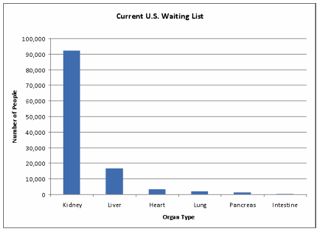Each year, when they obtain their driving permit, thousands of teenagers are asked if they will consent to become an organ donor. What teenage drivers do not realize is a simple “yes” to becoming an organ donor could save the lives of at least eight other people, according to health-first.org, a website for Florida-based hospitals. In a recent study, donatelife.net, an educational site created to inform and inspire Americans about organ donation, says, “90% of Americans support donation, but only 30% know the essential steps to take to be a donor.”
do not realize is a simple “yes” to becoming an organ donor could save the lives of at least eight other people, according to health-first.org, a website for Florida-based hospitals. In a recent study, donatelife.net, an educational site created to inform and inspire Americans about organ donation, says, “90% of Americans support donation, but only 30% know the essential steps to take to be a donor.”
“More than 19,000 organ transplants are performed in the United States every year,” reports health-first.org. However, approximately 106 people are added each day to the organ waiting list, and 18 people die every day waiting for an organ, as reported by upmc.com, the website of the University of Pittsburgh Medical Center. According to donatelife.net, there are over 100,000 people currently waiting for a transplant.
Kidney failure, heart disease, diabetes, and cirrhosis of the liver (a deadly liver disease) are just a few conditions that could require an organ transplant, according to optn.transplant.hrsa.gov, the government's organ procurement and transplantation website.
Robert D. Truog, Professor of Medical Ethics at Harvard Medical School, told the New England Journal of Medicine in 2008, “The growing transplant waiting lists obligate us to strive to increase the supply of transplantable organs.”
For Missouri residents becoming a donor is quite simple: join through any driver’s license office, sign the back of your license, or register online at www.missouriorgandonor.com. If a donor registers through any process, it is vital for them to inform their family who make the final decision to donate the deceased person’s organs.
To receive a donated organ, it is first necessary to obtain a referral from a physician and then contact a transplant hospital to schedule an evaluation appointment. The hospital transplant team decides if the applicant is an acceptable candidate to register, according to organdonor.gov, a website created to increase awareness of organ transplantation and promote the success of organ donation. The patient’s income, social status, or race are not factors that affect the waiting time for an organ, according to organtransplants.org.
Practically anyone can be an organ donor. Most religions support the act of donating organs and view it as a selfless operation of charity and love, according to organdonor.gov. Some folks are opposed to organ donation because of their beliefs in the afterlife, according to organdonor.gov. No one is too old or too young to donate, because it is not age, but the condition of the organs that is most important, according to organdonor.gov. Only those with the Human Immunodeficiency Virus, cancer, or disease-causing bacteria or viruses in their blood are barred from donation, according to organdonor.gov. Another exception is potential donors who suffer a cardiac death, in which the heart stops beating, because the organs deteriorate too quickly due to the lack of oxygen, according to health-first.org.
There are two types of organ donations: nonliving and living. In nonliving donations, hospitals contact the Organ Procurement Organization (O.P.O.) upon the donor’s death, according to optn.transplant.hrsa.gov. The O.P.O. then evaluates potential donations and finds a corresponding patient by executing a match run through the United Network for Organ Sharing computer system, according to optn.transplant.hrsa.gov. The organs are then extracted through a small incision and are kept in a cooler during transportation, according to organdonor.gov and optn.transplant.hrsa.gov. According to organdonor.gov, organs can only be stored between 6 to 72 hours, depending on the organ.
A living donation is when an organ is donated from a living person. Blood is the most common type of living donation since it is continuously being replaced in the body. Blood can be donated every 56 days, according to mayoclinic.org. Parts of the liver, pancreas, lung, and the entire kidney are organs that can be transplanted from a living donor, according to transplantliving.org, a website constructed to provide medical advice to users. Living organ donations have become more frequent in the U.S. during the last two decades, with 5,452 in 2010 compared to 2,123 in 1990, according to optn.transplant.hrsa.gov, even though these donors must deal with recovering from elective surgery.
Most families find that organ donations from a loved one help them go through the sorrow of death, according to health-first.org. They are comforted by the thought of a positive benefit to their loved one’s passing. Some people view organ donation as an act of kinship.
Luc Noel, Coordinator of Clinical Procedures at the World Health Organization, states, “Donation of organs after death, when you don’t need them any more, is a civic gesture.”
Some worry that in the case of an emergency, doctors will not do their very best to save the life of a registered organ donor, according to mayoclinic.com. “From a medical standpoint, patients must receive the most aggressive life-saving care in order to be potential organ donors,” explains donatelifecalifornia.org, the state's online donor registry.
With the lack of human organs, some European countries are requiring all citizens to be organ donors unless the government is notified otherwise, according to www.anatomicalgiftact.org, a website that facilitates organ donation and inform users of the changes in federal law.
An alternative solution on the horizon is xenotransplantation, the transplantation of organs between different species. For example, the insulin-producing tissue in a pig can be transplanted into a human to cure Type I diabetes, according to actionbioscience.org, an educational website of the American Institute of Biological Sciences. Still in the early stages of research, scientists are most concerned about introducing new diseases to the human race through xenotransplantation.
According to qmed.com, a website supporting the medical device industry, the development of artificial organs, such as the artificial heart, kidney, liver, pancreas, and lung, is another revolution being investigated. This, too, is new science, and in most patients, artificial organs did not function as well as natural replacements.

This work is licensed under a Creative Commons Attribution-NonCommercial-NoDerivs 3.0 Unported License
















What a well researched story! You used excellent sources on the topic, and I appreciated how you brought in the bit about organ donation for Missouri residents to make it especially relevant. It’s funny timing for me as well, as I just recently marked the back of my driver’s license to become an organ donor after a conversation with my wife.
Good Job Rose, this was a very informative article. That brings a lot of attention to people who aren’t aware of this(like Me) you have a lot of really good sources. So nice Job!
This is a very well written article. It’s sad to think that only a small percentage of people know how to become a donor. I’m proud to say that I am.
This is an awesome article! I am an organ donor so this really fits with me perfectly about why I chose to do this.
Good job, very well written
This was an interesting topic to read about. I never knew so much went into organ donations or how long the wait for an organ could possible be. Great article, keep up the good work.
I love this story. It tells how much one word can change so many lives. Why do we need them if we’re gone anyway? I think this is a great way of changing some people’s minds.
Very well done Rose. This is easily one of the best articles I have read to date. It is very well written, and covers a very intersting subject whose significance in recent years most people are unaware of. Great job and i look forward to your next article.
great article the topic is something that alot of people dont think much about and ussually just say no
very interesting. i know realize how important it is to be a donor!
Good topic because everyone has to make this decision when they get there license.
Very well written article. It started with a good lede and caught my attention. This is a situation every driver faces so it is very news worthy. The sources are direct and give proof to the article.
This is a well written article and I found it interesting. I think that this topic concerns almost all people becasue donating your organs is a decision that each person must make when getting their license.
This is a very well written article covering a very important issue. I love the detail and obvious effort put into this. Well done!
This is a very interesting and informative topic. There was a great use of sources, and you took a lot of things into consideration when writing this article (even including most religions support it). Great job!
Very well written. Great lede. It’s is an extremely relatable topic and has some good, believable sources
I like that I can relate to this article because before knowing if i wanted to be an organ doner or not i wanted more information about it and this paper gives it! also many good details.
great job! i think beiong a donor is a great use of your body after you die
I really like this article. mostly because i did register to become a organ donor, i feel like this article gave me the additional info i needed.
i love this article so very fun it gives me so much informations and it is so very awsome
Great title! I totally believe in "recycling yourself" (: